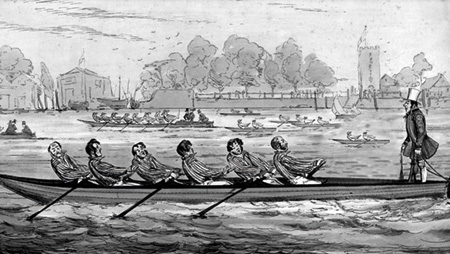|
The ‘Oxford Race’, as it was called, originated in a bet laid by Captain Standen, of the 3rd Regiment of Guards, with Lord Newry, that six officers of the Guards would row from Oxford to London in sixteen hours, and the wager was decided on the 12th of May, 1824.
A boat, named The Mary, was built on purpose for the occasion, she was wherry built, broad in the beam, and very light according to the ideas of that day. In consequence of the indisposition of one of the crew originally selected, an alteration had to be made at the last moment, and it so happened that the six officers who manned The Mary for the match had never rowed together before. They were the following:
Captain E Douglas - Grenadier Guards
Captain the Hon J Westenra - Grenadier Guards
Captain H Seymour Blane - 3rd Regiment of Guards
Captain J Standen - 3rd Regiment of Guards
Captain R Short - Coldstream Guards
Captain Harrington Hudson - Grenadier Guards
 |
Colonel Meyrick was the umpire, and started the boat at 9.01am from Isaac King’s barge, moored off the meadows at Oxford. Westminster Bridge was reached at 6.46pm, the crew winning the match with thirteen minutes to spare. The time taken for refreshment was four minutes in Pangbourne (Whitchurch) Lock, where the crew had a mouthful of breakfast, fifteen minutes in Boulter’s (Maidenhead) Lock, where they had hot meat and port wine, which Lord Newry had provided for them, four minutes in Old Windsor Lock, and four minutes in Teddington Lock.
There were then twenty-seven locks between Oxford and Westminster, two of which, viz., those at Windsor and Staines, were shot; the loss of time in passing through the others was one hour and eleven minutes, so the actual work was done in fourteen hours and thirty-four minutes, the pace being at an average of about seven and three-quarter miles an hour. The day was as bad as it possibly could have been, with a very strong north easterly wind blowing against the boat, so that the lightness of her construction was a very considerable disadvantage.
A proposal to postpone the match in consequence of the weather was negatived by the Umpire. The gale told so severely against the crew in the long reaches above and below Reading that they reached Maidenhead nearly an hour after time, and the betting was then any odds against them; but, after their fifteen minutes rest and refreshment there, they rowed on so gallantly that the lost time was soon regained.
At Teddington the boat of the 3rd Regiment awaited them, to ‘clear the way’ as they said, but before Richmond was reached it had been rowed out of sight. After passing Richmond the gale increased, and the steering of the London waterman was so bad as to excite suspicions of his having been bribed, heavy bets having been laid against the crew.
The crew never left the boat except at Pangbourne and Maidenhead, and, except at those two places, they had no refreshments but cold tea and sandwiches, of which each man had a small supply under his thwart. The betting in London was seven to one against them, as a crew of picked and trained watermen who had been backed to row the same distance in eighteen hours had failed to accomplish it. The coxswains were Isaac King to Maidenhead, Cannon to Teddington, and Thomas Hills to Westminster Bridge.
An immense concourse of people crowded the bridge to see them come in, and they were loudly cheered for their pluck and endurance. Not one of the gallant crew was able to stand, But they were lifted out of the boat and conveyed to bed as speedily as possible. There is reason, however, to feel that the constitution of one of them was lastingly impaired and that his life was shortened by his exertions on this occasion. This officer was Captain Standen.
An account of this celebrated match against time will be found in the Annual Register for 1824.
From The Brigade of Guards Magazine. December 1897
Editor’s Note:
This would be a wonderful challenge for May 2024, 200 years on from the original Oxford Race. With fit oarsmen and a modern boat, there is every chance that a crew would complete the race in much less than 16 hours, with hopefully no need for them to be carried home like those in 1824!
|
|

